








Creighton University has announced the retirement of Dr. Leonard Greenspoon. For nearly 30 years, Dr. Greenspoon has occupied the Philip and Ethel Klutznick Chair in Jewish Civilization at Creighton University.
The Jewish Federation of Omaha (JFO) will hold a special reception in Dr. Greenspoon’s honor on Wednesday, April 16, 2025, from 56:30 p.m. at the Jewish Community Center (JCC). There will be a brief program at 5:30 p.m. The public is invited.
The Klutznick Chair is considered one of the most unique positions created for academic purposes. It was the “brain child” of the donor, Philip Klutznick, a graduate of Creighton’s School of Law. At the time of the donor’s enrollment in the late 1920s, Jewish students were often denied ad-
MUSHKA TENENBAUM
Chabad of Nebraska
ANNETTE VAN DE KAMPWRIGHT Jewish Press Editor
mission from many American universities or their admissions were restricted. However, Creighton, a Catholic and Jesuit institution welcomed Jewish students.
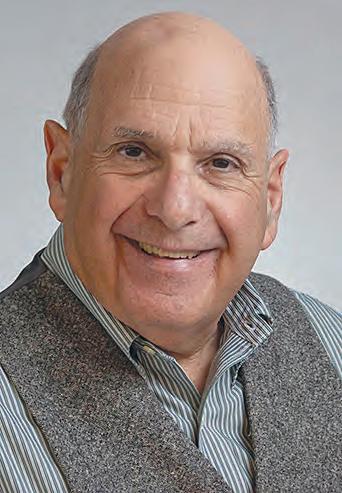
In creating the Klutznick Chair, the donor intended to bring the Catholic Community of Creighton together with the Jewish Community of Omaha. Klutznick did not want the Chair to be occupied by an “ivory tower” scholar who was only involved at the University. The agreement establishing this position expects the applicant to also be familiar with the affairs of the Jewish Community. The Chair is required to act as an advisor to the JFO and other Jewish institutions regarding adult Jewish education.
Dr. Greenspoon has fulfilled this unique position with flying colors. While the idea of an annual academic symposium originated with Dr. Greenspoon’s predecessor, See Leonard Greenspoon page 3
Camaraderie. Closeness. Support. Empowerment. Understanding. Friendship.
These weren’t just words floating around at the latest Chabad Ladies’ Night Out-they were baked right into the experience (along with some seriously good sourdough).
This wasn’t just another gathering. It was a night where young womenmothers, homemakers, professionals, and everything in between-came together, not just to unwind, but to laugh, learn, stretch and share stories that only people living the same reality can truly understand.
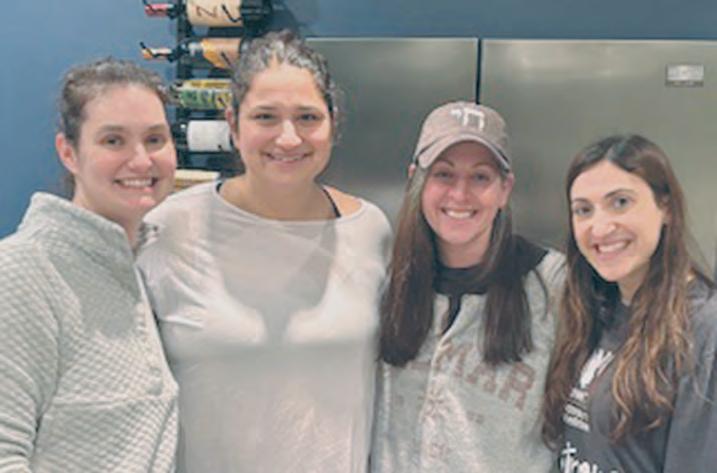
Hosted in the cozy warmth of a participant’s home, the night kicked off with a signature sourdough experience. And let’s be real-nothing says “Jewish women’s night out” quite like bonding over carbs.
“I came for the company,” one woman joked, “but I stayed for the bread. And maybe also for the first uninterrupted conversation I’ve had
all week.” the conversations were just as rich as the bread itself-stories of motherhood, balancing life and those ever-elusive moments of self-care.
After the Havdalah service, led by Rabbi Mendel Katzman, the mood shifted from lively to deeply meaningful. The flickering candlelight, the fragrant spices, and the soulful melodies See Night of Connection page 2
From March 3 through 7, David Finkelstein, together with his sons Ari and Asher visited Israel. The reason: Ari’s twin, Ethan, who is enlisted in the IDF, received his red beret.
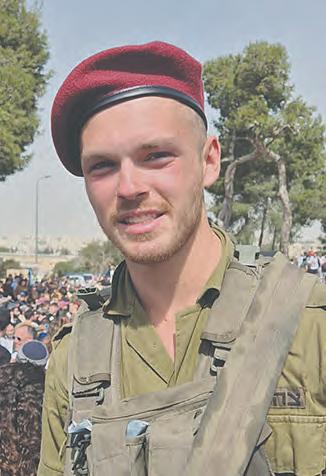
“The beret ceremony was to symbolize the end of basic training,” David said, “and indicates he is now a full-fledged member of the tzankhahnim (paratroopers) as symbolized by the awarding of the kumtah (red beret), which only paratroopers wear. The date was Wednesday, March 5. There were over 500 recruits inducted into the tzan-khahnim that morning, and the ceremony was held in Jerusalem at Ammunition Hill. After this, he is assigned to his permanent base and starts a final four months of training.”
While David’s wife, Becca Ruetsch Finkelstein, was not able to physically be there for the ceremony, she was able to watch via a livestream that was made available to family members. “I felt very proud watching the ceremony,” she said, “and couldn’t stop crying while watching it and wishing I could have been there in person.” Just like the rest of the family, she is immensely proud of what Ethan has accomplished.
Ethan made Aliyah on January 3, 2024 and drafted into the IDF in May of that year. At that moment, he began a three-year minimum commitment.
“As a parent, you always want to see your child achieve their goals,” David said, “and this was a huge one for Ethan. While the beret ceremony was great to see, and a very proud moment, it also means that he is one step closer to completing training and possibly being deployed, which is nerve-racking to say the least.” Ari was impressed as well: “Watching the ceremony, I felt proud of him for all that he has accomplished to reach this point.”
Younger brother Asher took it one step further: “It made me proud to See The Red Beret page 3
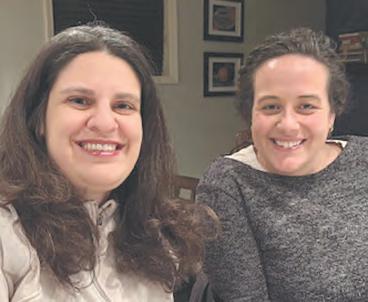
Continued from page 1 made it a moment to pause and breathe in the blessings of Shabbat before stepping into the week ahead.
And speaking of breathing-next came cozy yoga, led by another participant. It was the kind of session designed for real people (read: moms who have picked up their toddlers 87 times that day and desperately needed a good stretch).
“At one point, I wasn’t sure if I was breathing deeply or just sighing dramatically,” someone quipped. “Either way, it felt amazing.”
Another woman added, “I came to yoga with a week’s worth of tension in my shoulders. By the end, I was loose enough to consider forgiving my toddler for the yogurt explosion in my car.”
After yoga, no one was in a rush to leave. Instead, the women gathered around for a latenight heart-to-heart with Rebbetzin Shani Katzman.
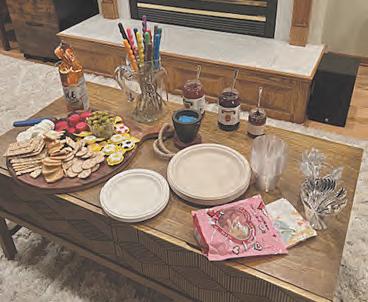
Topic of discussion? Motherhood. Balance. And the age-old question: How do we do it all without losing our sanity?
“Turns out, we don’t,” someone laughed.
“We just have each other to talk us off the ledge when the baby won’t nap, the laundry is in a state of emergency, and dinner is... well, whatever’s in the freezer.”
It was honest, raw, and hilarious, because let’s face it, motherhood is nothing if not a mix of deep love and absolute chaos.
Time flew by, and before anyone realized, it was almost midnight. But wait; it was the night of the clock change, so technically, it was already 1 a.m.
“This is the latest I’ve stayed up since having kids,” one woman declared. “And I regret nothing.”
Another added, “Honestly, I’d do this every night if someone else handled my toddler’s 6 a.m. wake-up call.”
For many women, joining Chabad Ladies’

5th Circle Theatre’s Wizard of Oz (Youth Edition) | 7 p.m.
Ticketing
J: Rangbrook Ensemble | 7:30 p.m. | Gordman
ArtsPeople Ticketing - $15/Advance | $20/Day Of
Film & Friends: Bucket List | 1 p.m.
- Open to all community 17th Rock & Roll Goes Hollywood (Lecture) | 7 p.m. | Wiesman Room Daxko Ticketing - $10/Members | $12/Non-Members 23rd Yom HaShoah Community Commemoration | 7 p.m. Free – Open to all Community
MAY
7th/8th Performing Arts Dance Recitals
19th/20th Performing Arts Piano Recitals 29th Mary Poppins (JCC Performing Arts) | 6:30 p.m.
Daxko Ticketing - $12.50 Adv | $15 Day of | $50 Patron 11th Film & Friends: Hidden Figures | 1 p.m. Free - Open to all community
JUNE
1st Mary Poppins (JCC Performing Arts) | 1 p.m. & 4:30 p.m.
Daxko Ticketing - $12.50 Adv | $15 Day of | $50 Patron 5th JFO Awards Night & Annual Meeting | 6:30 p.m. Free – Open to all Community
Film & Friends: True Grit | 1 p.m. Free - Open to all community
29th Summer Vendor Market | Noon-4 p.m. | Goldstein Venue Free Entry for Shoppers!
Night Out was a hesitant step at first. Would they fit in? Would they have time? Was this something they really needed?
The answer? Yes, yes, and absolutely yes.
“There is nothing like speaking with likeminded people living the same experiences,” one woman shared. “These ladies get it! I feel privileged to be part of the Chabad Young Women’s Group.”
Another chimed in, “Being part of Chabad Ladies has given me a community, and now I’m busy with events all week-Ladies’ Night, the hamantaschen bake, the Sunday pod for tots... I went from feeling alone to wondering how I ever lived without this!”
To keep things fresh and accessible, the group alternates between evening meetups and brunch gatherings, rotating locations across town. Whether it’s a cozy home setting, a trendy café, or an outdoor park, the goal is simple: to create spaces where women can come together, feel seen, and leave a little lighter, a little stronger, and a lot more connected.
So, if you’ve been looking for something like this, a space where you can laugh, vent, share, be inspired, and eat ridiculously good food, consider this your invitation.
There’s always room at the table (especially if you bring the wine).
And who knows? The next event might just be exactly what you need, even if you don’t know yet!
Contact Mushka if you are ready to be in! Mushka@ OChabad.com

MARK MARTIN
Executive Director, JCC
For the last several weeks, our Pennie Z. Davis Early Learning Center Step 4 students have been hard at work learning about different artists, and types of art. We were thrilled to show off our masterpieces in our Step 4 Art Museum. Arts education encourages fine-motor skill development, creativity, social-emotional development, cultural awareness, problem solving skills, and critical thinking skills. Artistic pursuits such as this promote critical thinking and theory of mind, by providing opportunities to explore emotions, perspectives, and thoughts of others through creative expression.
The ELC is a place where children can develop healthy independence, positive social interactions and strong thinking skills in a developmentally and educationally appropriate Judaic environment... a place where they can explore and play, and make independent
See ELC Art Museum page 4
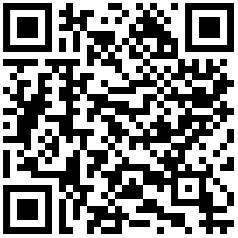
We will be publishing our annual High School Graduation Class pages on May 23, 2025.To be included, email student and parents’ names, current high school and college you will attend with a photo to: jpress@jewishomaha.org by May 5, 2025.

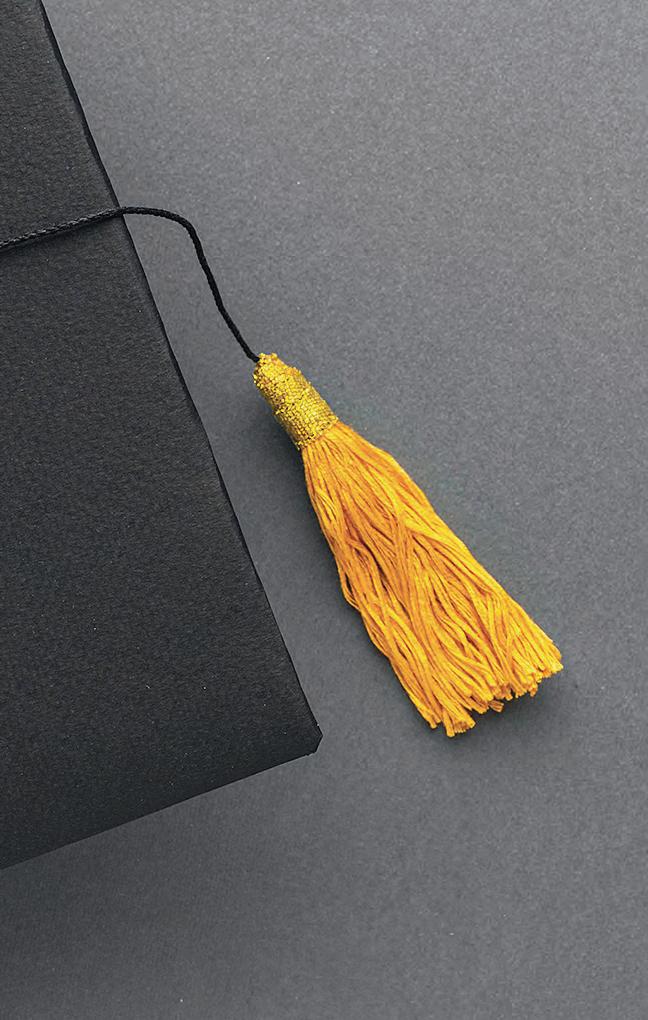
JFO Library Specialist
DVD:
Heading Home: The Tale of Team Israel
A stirring story of sports, patriotism and personal growth, Heading Home charts the underdog journey of Israel’s national baseball team competing for the first time in the World Baseball Classic. After years of defeat, Team Israel is finally ranked among the world’s best in 2017, eligible to compete in the prestigious international tournament. Their line-up included several Jewish American Major League players-Ike Davis, Josh Zeid and ex-Braves catcher Ryan Lavarnway-most with a tenuous relationship to Judaism, let alone having ever set foot in Israel. Their odyssey takes them from Tel Aviv and Jerusalem where they are greeted as heroes, to Seoul where they must debunk their has-been, wannabe reputations. With their Mensch on the Bench mascot by their side, the team laughs, cries and does much soul-searching, discovering the pride of representing Israel on the world stage.
ADULT:
Last Twilight in Paris by Pam Jenoff
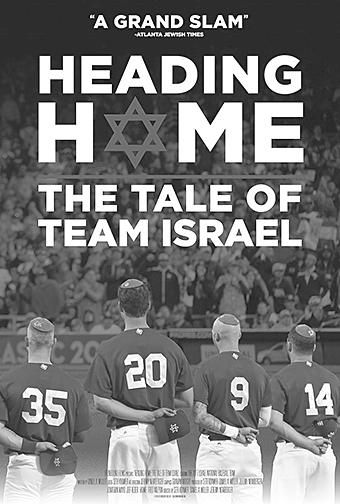

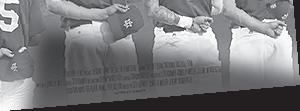
imprisoned there, torn apart from her husband when the Germans invaded France.
Louise races to find the connection between the necklace, the department store and Franny’s death. But nothing is as it seems, and there are forces determined to keep the truth buried forever. Inspired by the true story of Lévitan, Last Twilight in Paris is both a gripping mystery and an unforgettable story about sacrifice, resistance and the power of love to transcend in even the darkest hours. We Would Never by Tova Mirvis


A Parisian department store, a mysterious necklace and a woman’s quest to unlock a decade-old mystery are at the center of this riveting novel of love and survival, from New York Times bestselling author Pam Jenoff London, 1953. Louise is still adjusting to her postwar role as a housewife when she discovers a necklace in a box at a secondhand shop. The box is marked with the name of a department store in Paris, and she is certain she has seen the necklace before, when she worked with the Red Cross in Nazioccupied Europe — and that it holds the key to the mysterious death of her friend Franny during the war.

No one appears more surprised than Hailey Gelman when she comes under suspicion for the murder of her soonto-be ex-husband, Jonah. Hailey, nicknamed Sunshine by her mother for her bright outlook and ever-present smile. has always tried to do what is expected of her and is regarded as the family peacemaker. But is anyone, including Hailey, who she has always seemed to be?

Continued from page 1



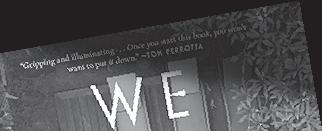

Following the trail of clues to Paris, Louise seeks help from her former boss Ian, with whom she shares a romantic history. The necklace leads them to discover the dark history of Lévitan — a once-glamorous department store that served as a Nazi prison, and Helaine, a woman who was
The months leading up to Jonah’s death have been fraught, including a bitter separation and a messy custody battle over their young daughter, Maya. When Hailey files a motion to relocate to Florida so she can be near her family, Jonah retaliates and the divorce begins to spiral dangerously out of control.
Sherry, Hailey’s mother, will stop at almost nothing to keep Jonah from getting what he wants. Nate, Hailey’s impetuous and protective older brother, has tried to keep his distance, but he can’t stand to see his little sister suffer. And then there’s Solomon, the patriarch, who is keeping a secret that threatens the stability and security Sherry has worked so hard to maintain. Soon, they are forced to reckon with who they are as individuals and as a family, and just how far they will go for each other.
Inspired by a true story, We Would Never is a gripping mystery, an intimate family drama, and a provocative exploration of loyalty, betrayal, and the blurred line between protecting and forsaking the ones we love most.
Dr. Menachem Mor, Dr. Greenspoon expanded it. Scholars from all over the world have come to Omaha every fall since 1988.
To enhance this symposium, Dr. Greenspoon formed alliances with the Nathan and Hannah Schwalb Center for Israel & Jewish Studies at UNO, the Kripke Center for the Study of Religion and Society at Creighton University, and the Harris Center for Judaic Studies at UNL. Along with Creighton and the JFO, these entities are annual sponsors. Thanks to Dr. Greenspoon’s efforts, the Klutznick Symposium has become a prestigious event. In his advisory capacity, he has also been involved in many programs for the JFO and other Jewish organizations. Additionally, Dr. Green-
Continued from page1 watch the ceremony,” he said, “and it made me want to consider joining the IDF as well.”
During some downtime after the ceremony, David and his kids found themselves wandering around Jerusalem and doing some shopping. In one of the stores, a shopkeeper said these words:
“Thank you for giving your son to Israel.” It caught David off-guard.
“It was really unexpected,” he said, “and so I just smiled and said ‘you’re welcome.’ I really didn’t know what else to say when a total stranger hit me with a massive reality check. I wanted to tell him it was all Ethan’s idea, and we had nothing to do
spoon has maintained his own academic endeavors. He is an internationally recognized scholar, especially in the fields of biblical studies and translations.
“It has been my honor and privilege to have worked with Dr. Greenspoon from the beginning of his tenure.” said Steve Riekes. Praise of Dr. Greenspoon was echoed by Marty Shukert. They are the appointed representatives of the JFO regarding matters related to this Chair. Bob Goldberg, CEO of the JFO, also commended Dr. Greenspoon for his communal and academic contributions.
The Catholic community of Creighton University, the Jewish community of Omaha, and all those interested in biblical studies are urged to come together on April 16 to wish Dr. Greenspoon the very best in his retirement.

with it, but I was just too stunned by the concept of giving my son to Israel. Back when Ethan first told us he wanted to enroll in Garin Tzabar (the Lone Soldiers Program), and subsequently enlist in the IDF, he told us he wanted to be part of something bigger than himself. I am reminded that he is now part of Israel’s history.”
David said the Finkelstein family “would be remiss if we didn’t take this opportunity to thank everyone in the Omaha Jewish Community who has offered prayers and support for Ethan, and for us. This is a very special community we have here, and we feel blessed to be a part of it.”
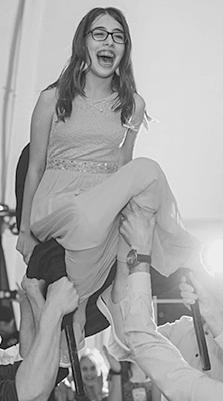




GRACE GILSON
JTA
When she was five years old, Kitty Saks’ home in Vienna was commandeered by the Nazis, leading her family to flee to Brussels, where she was hidden in a convent until the Allies liberated Belgium. Twenty-seven members of her family were killed in the Holocaust.
Until a few weeks ago, that story could be read on the website of a U.S. Air Force unit, one of the many ways the government commemorated the Holocaust.
But now it is gone, one of many Holocaust remembrance articles taken down as part of the Defense Secretary Pete Hegseth’s effort to rid Pentagon platforms of anything related to DEI.

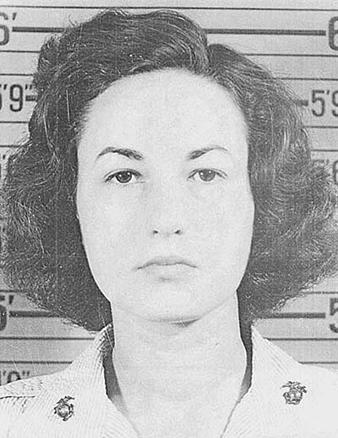
Bea Arthur’s U.S. Marine Corps portrait, 1943. Her actual name was Bernice Frankel.
In a February 26 memo titled “digital content refresh,” Pentagon leadership was directed to “remove all DoD news and feature articles, photos, and videos that promote Diversity, Equity, and Inclusion (DEI).” More than 24,000 articles could potentially be removed, according to a database obtained by CNN.
Also caught in the net of the anti-DEI purge are articles focused on race, gender and LGBTQ experiences, as well as others on topics such as cancer awareness, suicide prevention and sexual assault. An article on Jackie Robinson, who served in the military and is widely admired for breaking baseball’s color line, was removed and has been reinstated.
Also removed was an article on Bea Arthur, the Jewish Golden Girls star who served in the Marines during World War II.
Beyond Saks’ story, at least two more pages documenting
Continued from page 2 choices while feeling secure and warmly nurtured.
When walking through the museum, we encouraged visitors to ask their child openended questions about what they were seein to help them take on other perspectives. Why did the artist create this? What do you see when you look at this picture? Why did the artist give this name to their artwork?
Holocaust remembrance were also removed. One page, titled A Cadet’s Perspective: Holocaust Days of Remembrance, described a cadet’s experience visiting concentration camps a decade ago and the ways they informed his experience in the U.S. Air Force Academy.
The cadet, Robert Breen, said in the article “in order to stop another Holocaust from happening again we need to start small. There is no room for intolerance and hate at the smallest level. We need to stick up for each other and support our differences instead of ignoring them. We cannot continue to be bystanders -- if we are too afraid to stand up for ourselves and our wingmen, fear and intolerance will prevail.” (Breen’s article can still be found at www.webarchive.org, ed.)
Another page stripped from the Pentagon’s platforms commemorated Holocaust Remembrance Week and told readers to not forget the importance of religious diversity:
“The first place we must look is within ourselves. Do we allow stereotypes to determine how we think of one another based on their religion? Do we diminish another’s beliefs because they are different from our own? It is in examining ourselves and the inner thoughts that we allow to foster, we will be able to create change,” the article read.
In a statement, Pentagon Press Secretary John Ullyot — who referred to DEI initiatives as “Woke cultural Marxism” — said pages that had inadvertently been removed would be reinstated but did not detail if or when the Holocaust-related articles would go back up.
“We are pleased by the rapid compliance across the Department with the directive removing DEI content from all platforms,” his statement said. “In the rare cases that content is removed — either deliberately or by mistake — that is out of the clearly outlined scope of the directive, we instruct the components and they correct the content so it recognizes our heroes for their dedicated service alongside their fellow Americans, period.”
Saks died in 2021 at the age of 88. In the article about her experience, which can still be viewed on the Internet Archive’s Wayback Machine, she was quoted saying, “I think the Holocaust should never be forgotten and it should be taught in schools, but not just a few lines.”
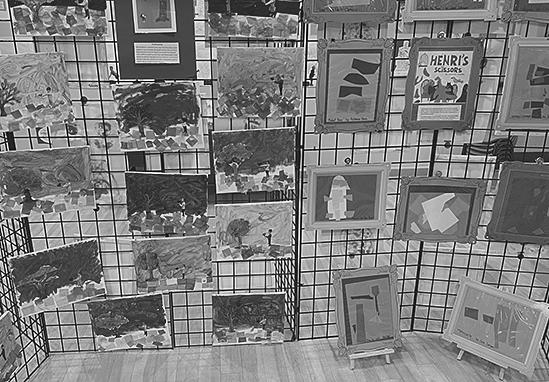
Thank you to all who visited our museum! We hope this encourages you to look for art and beauty all around you, not just in formal spaces.
It is our philosophy that young children represent a unique
B’NAI B’RITH BREADBREAKERS
segment of society with special needs and behaviors. Children’s relationships and experiences during their early years of life have a significant and crucial impact on their later growth and development. We believe that the importance of these formative years must not be underestimated. We are committed to the extreme importance of our role in your child’s total development. The daily environment must provide your child with all of the components necessary for his/her emotional, social, physical, and cognitive well-being. For more information about the Pennie Z. Davis Early Learning Center, please visit our website at www.jccomaha.org or email ELC@jccomaha.org
The award-winning B’NAI B’RITH BREADBREAKERS speaker program currently meets Wednesdays via Zoom from noon to 1 p.m. Please watch our email for specific information concerning its thought-provoking, informative list of speakers. To be placed on the email list, contact Breadbreakers chair at gary.javitch@gmail.com











TAMARA SCHUSTER
More postcards were received, bringing connection and strength: these happy IDF soldiers were recent recipients of postcards from the Omaha, NE community!
The recent P2G WG Solidarity Mission was meaningful, difficult and uplifting all at once.
The well-crafted itinerary, thanks to P2G WG Assistant Director Avital Ben Dror in cooperation with Partnership co-chairs, Moti Yeger (Israel) and Megan Maurer (US), provided a range of Western Galilee experiences and people-to-people dialogue to understand the impact of the recent war on the region and population.
Kol HaKavod to US Co-Chair, Megan Maurer, on receiving the prestigious Universal Peace Council Human Rights Leader honor! The award was presented last week during the Solidarity Mission’s visit to Yanuch, a Druze village.
Congratulations also go to Moti Yeger, Israel Co-Chair, on his completion of the Jewish Agency For Israel’s P2G co-chair course. With Moti’s participation in this program, we know his already strong, effective, and enthusiastic leadership of our Partnership can only grow.
This year has already shown great results in our Routes2Roots (R2R) program, managed by the Budapest Young Adults group.
The Pataki family from the P2G greater Youngstown, OH community (US), turned to Budapest R2R champion János Marosi for assistance in finding the family’s Hungarian Jewish roots. János has researched and traced the family history and via an online meeting presented his findings to the Patakis during which many names and places of the Central European Jewish roots of the Pataki family emerged.
As a follow-up to this research, this spring, the Budapest Young Adults group plans to visit the grave of one of the Pataki family ancestors who is buried in the Budapest Jewish Cemetery. To make this event a genuine, international P2G experience, the daughter of the Pataki family, who is currently living in
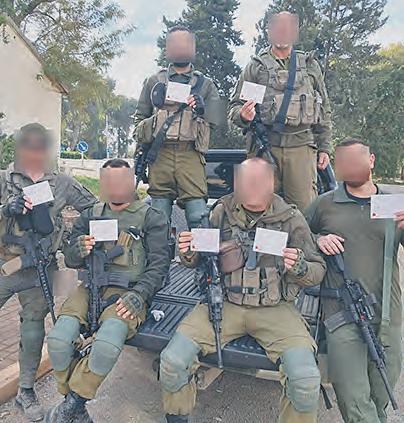
Amsterdam, plans to travel to Budapest to join the Hungarian group to commemorate her ancestor by placing a rock on his grave.
Wonderful people, touching moments, and connecting people through their roots are the core mission of the Routes2Roots program of Partnership2Gether! It’s not too late to discover your roots! Contact Budapest P2G Coordinator, Noemi Nemeth at NoemiN@jafi.org
My Jewish Kitchen is off to a GREAT start! 28 participants joined for the first session of the series, representing our WG, Budapest, and US communities. A new date for the second session, which will be Hungarianthemed is to be announced soon.
Want to learn more about our Partnership? Visit www.westerngalilee.org/il


JAY KATELMAN
JFO Director of Community Development Omaha and our Partnership2Gether community teamed up for another wonderful community visit. On March 10 and 11, Omaha had the privilege of hosting well known Israeli chef, Uri Arnold, owner of the restaurant “Arnolds.” Uri, along with his Muslim and Christian partners, also opened a restaurant in the Western Galilee: “Roots” in the city of Akko, situated in our Partnership region. Together, the three of them made it a must-stop destination. Recently, after a 25-year cooking career, Chef Uri started “Umami,” a consulting, marketing and branding company.

choice of malaby and a halva parfait (or both)! One thing is for sure: no one left with an empty stomach.
On March 10, Chef Uri cooked a threecourse family-style meal for 70 community members. It was a kosher meal that started with cocktails of beer and Israeli wine. The appetizer course included challah, salads, humus and falafel. The main course was lamb stew on rice and chicken stew with sumac and onion on lafa. For those who wanted a vegetarian option, Uri cooked eggplant in tahini with mushrooms.
Chef Uri addressed diners and explained his background and his cooking. Dessert was a
The following day, Chef Uri hosted a food demonstration for approximately 40 people, during which he showed them how to cook beetroot kubbeh. Everyone had a chance to help in the process, whether it was chopping ingredients or rolling up balls of meat. Shortly after, the soup was served. All flavors came together beautifully in the final dish.
The moral of the story: come to our Partnership events, you will not be disappointed-especially if food is involved. A special thank you to Chef Uri, his partner Hila, and Naama. Until next time!


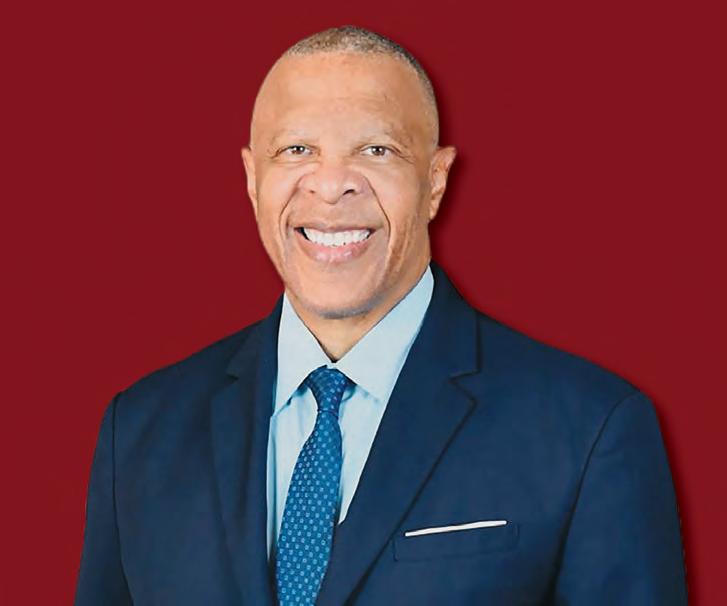
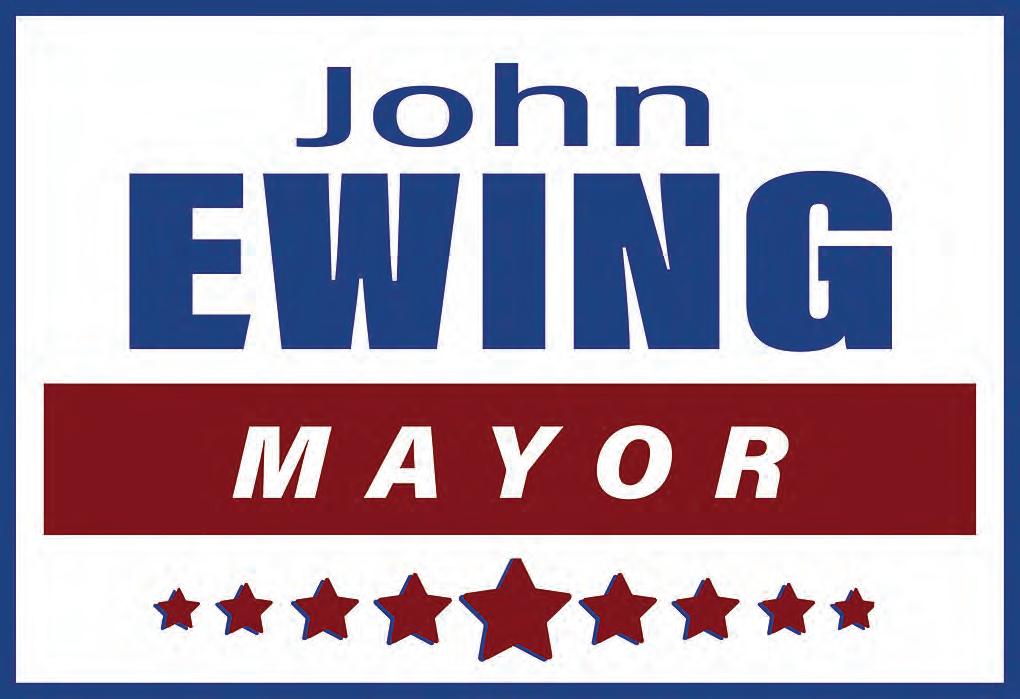
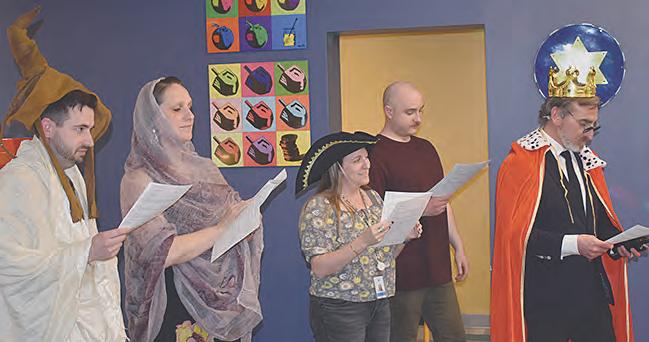
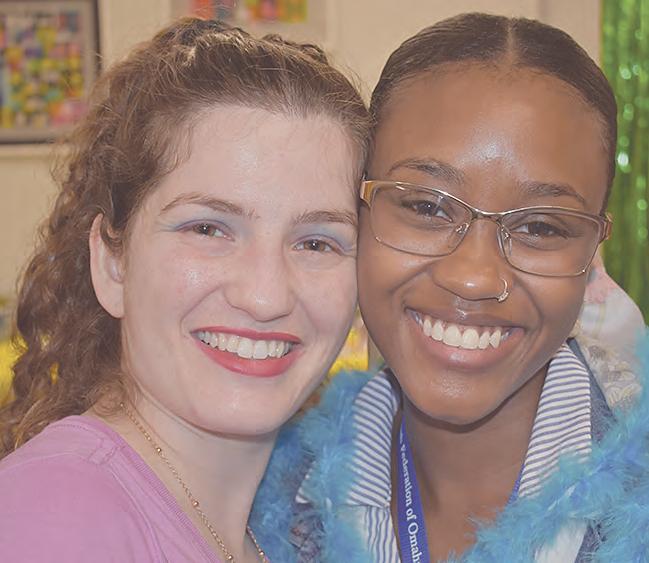
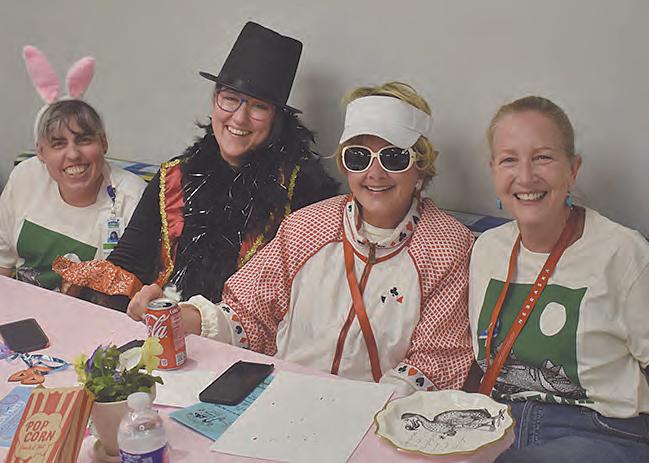
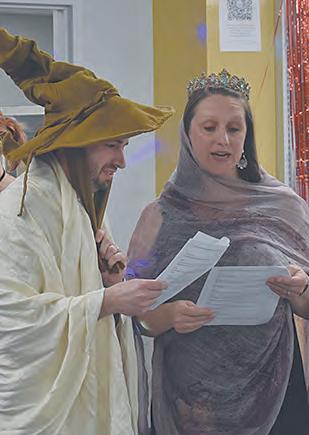

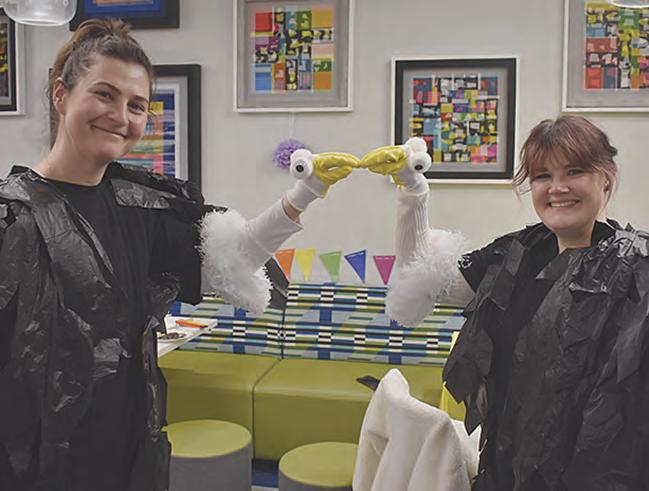
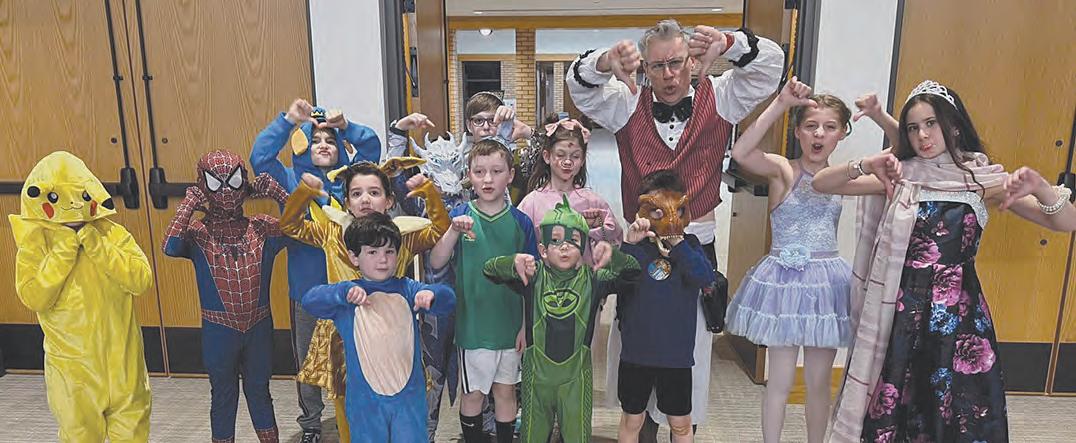

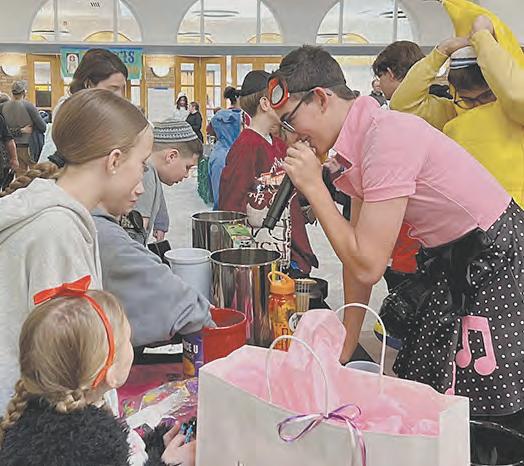
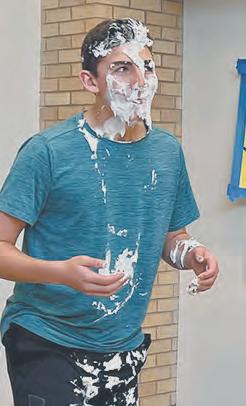
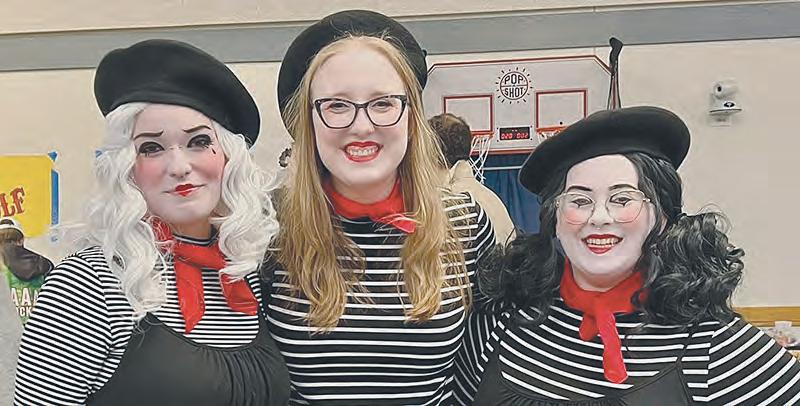
PHOTOS FROM RECENT JEWISH COMMUNITY EVENTS
SUBMIT A PHOTO: Have a photo of a recent Jewish Community event you would like to submit? Email the image and a suggested caption to: avandekamp@jewishomaha.org
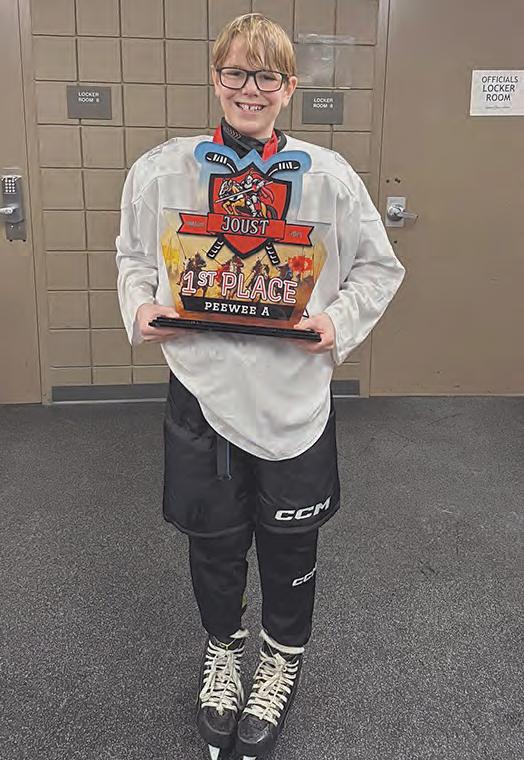
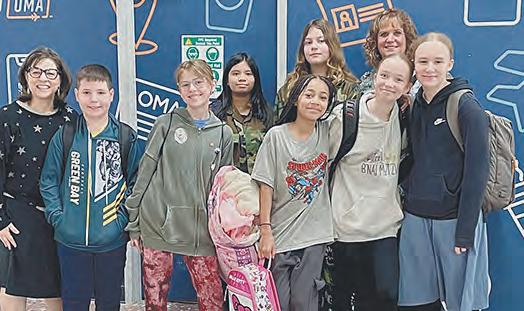
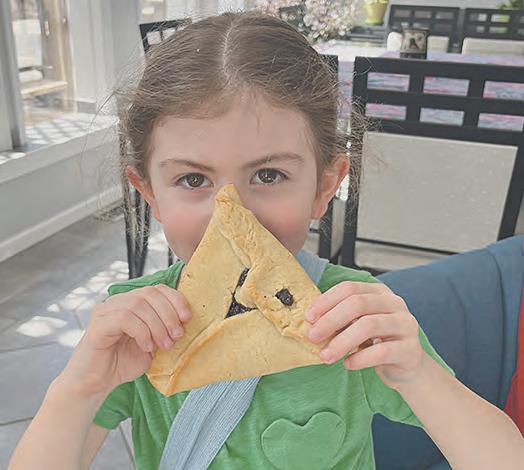
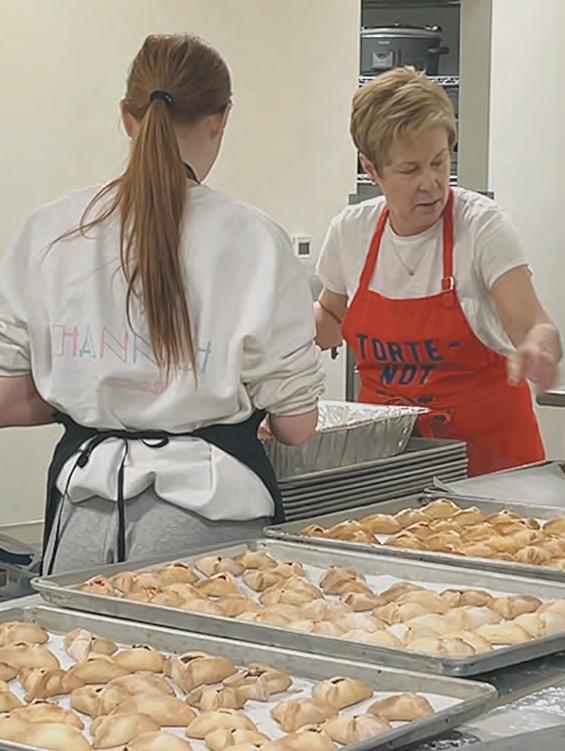
As the joyous festival of Purim approached, Temple Israel was proud to celebrate the remarkable efforts of our dedicated volunteers who worked tirelessly to bring this year’s festivities to life. From preparing delicious hamantaschen to ensuring the success of our annual Purim Carnival, Temple Israel’s volunteers truly embodied the spirit of community and giving.
“Temple Israel’s Purim Spiel and Carnival are not possible without the help of so many community volunteers,” said Cantor Joanna Alexander. “From Dani Howell writing our Spiel every year without fail, to those cooking and serving our Purim lunch; our many bakers of tasty hamantaschen and of course all our teachers and teen Madrichol who help run the carnival: Purim is an amazing celebration of Jewish resilience being enacted by the whole community coming together. Thank you to all!”
Purim wouldn’t have been complete without the beloved hamantaschen, and two dedicated volunteers stepped up to craft the perfect dough that became the foundation of this cherished treat. Their precision and hard work ensured that each triangle-shaped cookie was flaky, delicious, and ready for filling.
Once the dough was ready, 10 enthusiastic volunteers took to the ovens, skillfully baking tray after tray of golden hamantaschen. Their dedication ensured that Temple Israel had
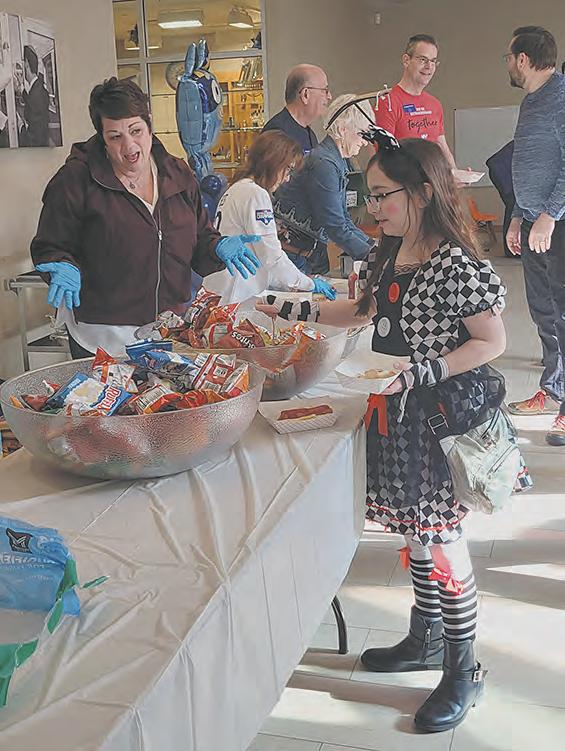
plenty of sweet delights to share during the carnival.
Spreading Purim joy extended far beyond the walls of the synagogue. Thanks to the hard work of eight devoted volunteers, beautifully packed Mishloach Manot gift lunchboxes were prepared with care and love.
At the heart of our welcoming community were our friendly greeters. The Purim celebration was enhanced by four volunteers who graciously greeted guests with warm smiles and helpful guidance. Their presence ensured that everyone felt at home as they joined in the festivities.
No Purim Carnival would have been complete without delicious food to fuel the fun. Eight talented volunteers came together to cook and serve carnival attendees.
“The common phrases suggesting what ‘makes the world go round’ often revolves around money, love, laughter or a combination thereof,” said Justn Cooper, Temple Israel Board of Trustees President. “This week’s Purim volunteers were clear evidence that all three elements were in great supply. We simply couldn’t have done it without you!”
Temple Israel is deeply grateful for the dedication and generosity of all our volunteers. Their efforts not only ensured a successful Purim celebration but also strengthened the bonds of our community. As we celebrated the season of joy and unity, we recognized that the true heart of Purim lay in these acts of kindness and service.
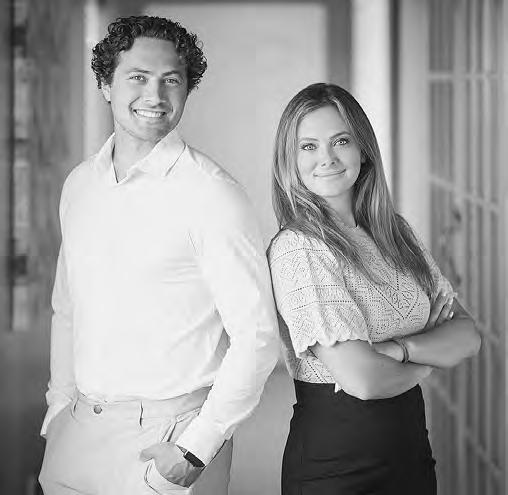
At CareMATRIX, we simplify the search for senior living with our FREE, personalized service. Our expert advisors help families navigate the options, whether it’s independent, assisted, or memory care. We offer tailored recommendations from our extensive network and accompany you on in-person tours to ensure you make an informed choice. Let us guide you through this important decision. For more information, please visit our website at www.CareMatrix.net or reach out directly.




(Founded in 1920)
David Finkelstein
President
Annette van de Kamp-Wright
Editor
Richard Busse
Will Fischer
Creative Director
Claire Endelman
Sales Director
Lori Kooper-Schwarz
Assistant Editor
Sam Kricsfeld
Digital support
Mary Bachteler
Accounting
Jewish Press Board
David Finkelstein, President; Margie Gutnik, Ex-Officio; Helen Epstein, Andrea Erlich, Ally Freeman, Dana Gonzales, Mary Sue Grossman, Hailey Krueger, Chuck Lucoff, Larry Ring, Melissa Shrago, Suzy Sheldon and Stewart Winograd.
The mission of the Jewish Federation of Omaha is to build and sustain a strong and vibrant Omaha Jewish Community and to support Jews in Israel and around the world. Agencies of the JFO are: Institute for Holocaust Education, Jewish Community Relations Council, Jewish Community Center, Jewish Social Services, Nebraska Jewish Historical Society and the Jewish Press Guidelines and highlights of the Jewish Press, including front page stories and announcements, can be found online at: www.jewishomaha.org; click on ‘Jewish Press.’ Editorials express the view of the writer and are not necessarily representative of the views of the Jewish Press Board of Directors, the Jewish Federation of Omaha Board of Directors, or the Omaha Jewish community as a whole. The Jewish Press reserves the right to edit signed letters and articles for space and content. The Jewish Press is not responsible for the Kashrut of any product or establishment.
Editorial
The Jewish Press is an agency of the Jewish Federation of Omaha. Deadline for copy, ads and photos is: Thursday, 9 a.m., eight days prior to publication. E-mail editorial material and photos to: avandekamp@jewishomaha.org ; send ads (in TIF or PDF format) to: rbusse@jewishomaha.org
Letters to the Editor Guidelines
The Jewish Press welcomes Letters to the Editor. They may be sent via regular mail to: The Jewish Press, 333 So. 132 St., Omaha, NE 68154; via fax: 1.402.334.5422 or via e-mail to the Editor at: avandekamp@jewishomaha.org.
Letters should be no longer than 250 words and must be single-spaced typed, not hand-written. Published letters should be confined to opinions and comments on articles or events. News items should not be submitted and printed as a “Letter to the Editor.”
The Editor may edit letters for content and space restrictions. Letters may be published without giving an opposing view. Information shall be verified before printing. All letters must be signed by the writer. The Jewish Press will not publish letters that appear to be part of an organized campaign, nor letters copied from the Internet. No letters should be published from candidates running for office, but others may write on their behalf.
Letters of thanks should be confined to commending an institution for a program, project or event, rather than personally thanking paid staff, unless the writer chooses to turn the “Letter to the Editor” into a paid personal ad or a news article about the event, project or program which the professional staff supervised. For information, contact Annette van de Kamp-Wright, Jewish Press Editor, 402.334.6450.
Postal
The Jewish Press (USPS 275620) is published weekly (except for the first week of January and July) on Friday for $40 per calendar year U.S.; $80 foreign, by the Jewish Federation of Omaha. Phone: 402.334.6448; FAX: 402.334.5422.
Periodical postage paid at Omaha, NE. POSTMASTER: Send address changes to: The Jewish Press, 333 So. 132 St., Omaha, NE 68154-2198 or email to: jpress@jewishomaha.org
ANNETTE VAN DE KAMP-WRIGHT
Jewish Press Editor
It’s the time of year where I pretend I’m getting ready for Pesach. Saying out loud I am preparing is the first step, and if I’m really lucky, I might get some chametz sorted this weekend. I did order a new Haggadah, and I texted my friend to remind her we should really finalize our plans for the seder. Does that count?
Someone told me the other day about the necessity to prepare physically, but also spiritually. And while I have long believed that all the cleaning, prepping, and shopping will magically give me that spiritual readiness, these days I am not so sure. Can we work on those two things simultaneously?
Perhaps we are obligated to not separate them, like a ‘two-sides-of-the-same-coin’ kind of thing. Maybe I can be spiritually ready, while ignoring some of the more cumbersome tasks around the house. Or I could have a perfectly neat and clean house without internalizing the holiday. Am I overcomplicating things?
Passover will get here, whether we are ready or not. My email is full of reminders. Now that Purim is behind us, I receive invites to everything from kosherfor-Passover cruises to the Manischewitz truck media preview in Manhattan. Press releases about what to read for Passover, deals on wine and where to order my matzah. They all mean well, but I find myself stressed at every sign that I am not ready.
Elana Mizrahi wrote: “Freedom means being able to appreciate your spiritual value as a Jew, as part of the nation of G-d. Freedom means that you fully
Editorials express the view of the writer and are not necessarily representative of the views of the Jewish Press Board of Directors, the Jewish Federation of Omaha Board of Directors, or the Omaha Jewish community as a whole.

understand that you have a purpose, and that everything happens for a reason. It is doing things that are meaningful, for a higher goal.”(chabad.org)
What does it mean to fully understand having a purpose? Two sidenotes: one, stress is the opposite of embracing freedom. Two, I complain too much, and I should know better.
Now that we’ve established I just need to stop kvetching (a really useful thing to tell yourself, trust me) it becomes clear what I need to do.
My friends and family know I make things happen by writing them down, and then crossing them off. I make lists; for shopping, for stories I need to write, for meetings, for memories and plans and dreams. If I write it down, it will happen. Perhaps not immediately, but eventually they will get done. When the words are on a piece of paper, they are no longer bouncing around my brain, allowing me to calm down and find some semblance of inner peace. Quiet, calm, kind of like a deep sigh. When I’m calm, I can much better reach for that purpose, and remember why I’m here.
And my purpose is to fully be a Jewish woman. There is no need for an extra adjective: I don’t need to be a perfectly organized superstar. I don’t need to be like anyone else, I don’t need to have the prettiest seder table or the best Pesach dessert, I don’t need to chase some imaginary goal. I just need to be a good me. G-d made me this way. There; that’s my purpose. Everything else is just background noise.
The “good me” writes shopping lists for the seder, and for the rest of Pesach. The “good me” takes care of the chametz, little by little, until we’re done. She also muscles her family into eating lots of ramen noodles, makes pancakes with the very last bit of flour and creates crazy meals with cookies, breaded chicken, grilled sandwiches and pasta. And everything will be fine.
Maybe next year, I’ll skip the stress and go straight to the part where I remember my purpose.
Love Trump or hate him, all Jews should object to his use of ‘Shalom’
SARAH BUNIN BENOR
JTA
As a scholar who studies Jewish languages, I have collected countless examples of Jews around the world using variants of the Hebrew word “shalom” to mean peace – and, by extension, to offer peaceful greeting and parting words.
Yiddish speakers greet each other with “sholem aleichem” and Juhuri speakers (from Azerbaijan) with “sholumi.” American Jewish organizations often greet callers and guests, “Shalom, welcome to [organization].”
Shalom and its feminine equivalent Shlomit are personal names, and many Jewish organizations are named Shalom, such as an Australian collective, a Turkish newspaper and hundreds of synagogues: Beth Shalom (house of peace), Rodef Shalom (pursuer of peace), Ohev Shalom (lover of peace).
We wish each other “Shabbat shalom” on Friday and Saturday, strive for shalom bayit within families, and remember a loved one with alav hashalom. These uses of shalom stem from our liturgy, which is filled with prayers for peace (Sim Shalom, Oseh Shalom).
In fact, until this month, I would have been hard pressed to think of prominent instances when “shalom” was used to signal an act of dominance or violence, though one comes to mind: an iconic scene in “The Hebrew Hammer” in which Jewish strongman Mordechai Jefferson Carver yells, “Shabbat shalom, motherf—ers!” and then shoots up a neo-Nazi bar.
Enter Donald Trump. Wielding the Jewish word meaning hello, goodbye and peace as a weapon, he has deployed it on social media to put his targets on notice: “Shalom Hamas,” when he warned the Palestinian terror group that it needed to release Israeli hostages or face consequences. “Shalom Columbia,” in announcing a $400 million federal funding cut over the university’s handling of antisemitism. “Shalom, Mahmoud,” about the detention of a Palestinian protest leader by immigration authorities.
Linguists know well that words often change meaning as they diffuse from one group to another. People with limited connection to the group where
the word originated may not fully understand what the word means, how it is pronounced, or how it is used.
But we also know that language can be changed on purpose, too. And in Trump’s case, I believe he is intentionally appropriating a Jewish word and warping its meaning and usage — running risks for both our communal conversations and those that we have with others in our shared country.
Trump could have said, “Take that,” “See you later,” or, even his catchphrase, “You’re fired.” By using a Hebrew word familiar to people of diverse backgrounds, he appealed to the common understanding that Hebrew is the primary language of Israel and a special language for Jews around the world. While expressing his intended semantic meaning, Trump also implicated Jews in his administration’s authoritarian and potentially illegal actions – defunding Columbia and detaining Mahmoud Khalil.
Trump’s use of “shalom.” “Thanks to Trump, ‘Shalom’ is now code for “You f—ed up and are about to find out,” the influencer Nioh Berg tweeted. Shabbos Kestenbaum has used the word to call for additional ICE activity at his alma mater, which he says is a hotbed of antisemitism: “Countdown to Shalom Harvard.”
It is natural for people to evaluate politicians’ ac-

It contrasts with the most famous previous use of “shalom” by a president: In his moving speech after the assassination of his friend, Israeli Prime Minister Yitzhak Rabin, President Bill Clinton famously said, “Shalom, chaver” — “Goodbye, friend.” Clinton’s vice president, Al Gore, also used the word as well as others in Hebrew and Yiddish in his campaign speeches and jokes for Jewish audiences. In their case, Jewish language endeared them to the crowd, as they demonstrated respect for Jewish culture and values despite their outsider status.
Trump’s use of “shalom” will not be as widely harmful as his other recent linguistic affronts, including his insistence on culling any words associated with diversity and his executive order designating English as the official language of the United States. But I worry that it will fan the flames of antisemitism. On social media, it already has, as we see in posts and comments like “Jew[s] be like ‘we don’t control the American government’ then write ‘Shalom’ on the official White House Account” and “He says America First but practices Israel First. Trump is a Shabbos Goy and a big disappointment.”
Sadly, some right-wing Jews have embraced
tions, including their language, through their preexisting orientation. As a progressive American, I strongly condemn Trump’s responses to campus antisemitism as further eroding our fragile democracy, using Jews as a pawn in his war against intellectualism and ultimately making Jews less safe.
But no matter what one thinks about Trump’s actions, I urge Jews to reject his use of “shalom,” which inverts the meaning our tradition holds most dear.
In fact, a Ladino proverb explicitly says, “no de shalom a el rasha” (do not greet [lit. give “shalom” to] the wicked), because that would dilute the peaceful connotations of this ancient Jewish greeting.
Let’s continue to say “shalom” to wish each other well and not let a few social media posts by a divisive leader change how we use our sacred Jewish language.
Sarah Bunin Benor is Vice Provost, Professor of Contemporary Jewish Studies and Linguistics and Director of the Jewish Language Project at Hebrew Union College-Jewish Institute of Religion. The views and opinions expressed in this article are those of the author and do not necessarily reflect the views of JTA or its parent company, 70 Faces Media.
JEFF ZEMAN JTA
We can’t make antisemitism go away by censoring antisemites.
Nevertheless, the Trump administration has said it is combating antisemitism at Columbia University by canceling $400 million in funding and detaining a former student over what the president has vexingly called “illegal protests” against Israel. It is also making a host of additional demands of the university. Some Jewish groups are applauding the effort. But as an American Jew and free speech lawyer, I can tell you that protest alone isn’t illegal — and that giving the government the power to punish hateful speech will only erode our own right to speak out against hate.
In the wake of the Oct. 7, 2023, attack led by Hamas on Israeli civilians and Israel’s military response, protests erupted on campuses nationwide. Some of the activities by student protesters were unlawful, like blocking fellow students from entering parts of campus or occupying buildings. But many students engaged in pure speech by marching, displaying signs or shouting slogans. These are protected and celebrated forms of protest in our country. Whether in support of Israel, Palestine or even Hamas, the First Amendment prevents the government from punishing or censoring them.
As a historically persecuted population, Jews have a vested interest in ensuring American civil rights protections remain in full force. The First Amendment guarantees not only the freedom to practice our religion in this country, but our ability to speak out when our rights and lives are in danger.
In 1943, 400 rabbis marched on Washington to draw attention to the mass murder of European Jews, helping lead to the creation of an American War Refugee Board that saved thousands of Jewish lives. In 1963, American Jewish leaders like German-born Rabbi Joachim Prinz marched again, this time with Martin Luther King Jr. Speaking just before Dr. King’s “I Have a Dream” speech, Rabbi Prinz lamented that his former countrymen “remained silent in the face of hate” and pleaded that “America must not become a nation of onlookers. America must not remain silent.”
But we endanger the ability to speak out when we allow the
government to erode our First Amendment protections. That’s why White House statements this week threatening punishment for anti-Israel speech should have all Americans concerned — even those of us who would appear, at first blush, to benefit.
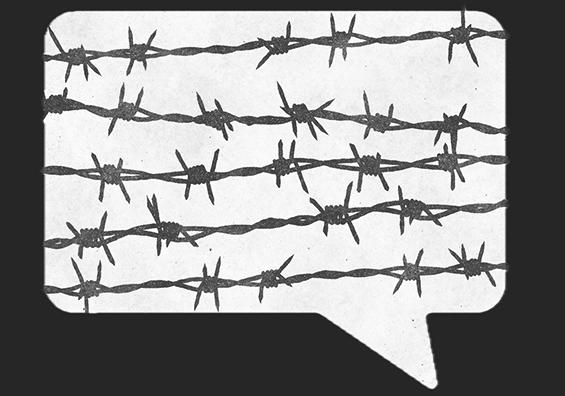
Regarding the arrest of Palestinian protester Mahmoud Kahlil by U.S. Immigration and Customs Enforcement, President Trump said, “We will find, apprehend and deport these terrorist sympathizers from our country — never to return again.” Secretary of State Marco Rubio posted an advisory from the Department of Homeland Security saying that Khalil had “led activities aligned to Hamas,” and has also claimed the power to deport a legal resident whose activities “would have potentially serious adverse foreign policy consequences for the United States.” But those justifications could merely describe Khalil’s on-campus protests, including his protected speech. Threatening to deport Khalil without accusing him of any crimes chills speech. And that threat extends to everyone, no matter what side of the Israeli-Palestinian debate you are on, or whether you are promoting or combatting antisemitism. Would a green-card-holding Jew feel free to criticize special government employee Elon Musk for publicly supporting the
far-right, German-nationalist AfD party, knowing our government could deem such criticism creates “adverse foreign policy consequences”? That standard is just too vague to risk deportation, and it permits the government to punish speech it just doesn’t like.
The Trump administration’s pledge to remove “pro-Hamas” students, coupled with Khalil’s arrest, make it hard to see the administration’s actions this week against Columbia and other institutions of higher education as anything other than attempts to police and punish campus speech.
To be sure, it has been a difficult year for Jewish college students, and there have been documented instances of bad actors preventing them from getting to class, or even assaulting them. Title VI requires colleges and universities that receive federal funding to ensure discriminatory harassment does not deprive Jewish students of an education, and it is possible Columbia has failed that obligation.
But protest alone is not grounds by itself for a Title VI violation. And the government did not make sure it was punishing only actionable misconduct before canceling Columbia’s funding, like it is supposed to. The Supreme Court rightly set a high bar for conduct that amounts to discriminatory harassment that is supposed to ensure pure speech rarely rises to that level.
And with good reason: Our institutions of higher education are supposed to be a marketplace of ideas. Even if you think those ideas are bad, protecting all speech means your speech is protected, too.
I’m no stranger to fear of the recent public increase in antisemitism. Last year, given online antisemitism approaching the anniversary of Oct. 7, my wife and I chose to keep our daughter home from her Chabad preschool that day. The current political moment terrifies me. Antisemitism is coming from both sides of the political spectrum, and it feels like there is nowhere to run. So instead, I think we should fight.
But allowing the government to ignore our rights to free speech would only deprive us of our most powerful weapon. The views and opinions expressed in this article are those of the author and do not necessarily reflect the views of JTA or its parent company, 70 Faces Media.
When the world turns upside down, rabbis can help us keep our heads on straight
RABBI SHIRA KOCH EPSTEIN
JTA
I am a rabbi. I should be preparing to chant Megillah and packing mishloach manot for Purim, but all I can think about is how everything feels “v’nahafoch hu”— topsy-turvy. Again. My husband is a federal employee, and his department just announced 80,000 layoffs. We don’t yet know what that means for him, but we are among hundreds of thousands of Americans bracing for uncertainty. After COVID, after Oct. 7, after years of crisis, you would think I would be used to this feeling — the world flipping like a carnival ride, never quite settling. Maybe that’s why I keep coming back to the story of Purim. Power shifts overnight. A people’s fate swings from comfort to doom to salvation, each in an instant. Nothing is what it seems. And in this Purim type of world, I have been calling on my own rabbis for guidance.
Yes, even rabbis need rabbis. But what exactly is a rabbi’s role at a time when we have every reason to feel unmoored? From my organization’s work with over 1,000 rabbis of all denominations, here is what I know to be true: Rabbis hold us in the chaos.
Whether an illness or the loss of a job, raging wildfires or political nastiness, rabbis sit with people in the mess of it all. One of my rabbis, Rabbi Naamah Kelman-Ezrachi, has been that presence for me. We prayed and cried together through the second intifada; she held my hand when my father died; was with me through the illness of my child, and even today we sat reflecting on rabbinic leadership. She knows that rabbis are there not to “fix,” but to accompany, walking us through narrow passages and pointing to the ways that each of these moments are holy, no matter how painful. “Gam ki Elech, b’geitzalmavet, lo ira ra — Even as I walk through the valley of the shadow of death, I will not be afraid” (Psalm 23) — not because the fear disappears, but the loneliness might wane. Rabbis remind us who we are.
The Purim story hinges on one moment: Esther might not have come forward to announce her Jewish identity and appeal to the king on behalf of her people. She nearly convinced herself she could stay safe by blending in, that she didn’t need to act. But then Mordechai entreated her: Maybe you are exactly where you need to be. Maybe you are more than you think you are.
In bringing people through immersive experiences, Rabbi Jericho Vincent brings many people back into community through immersive Jewish experiences where they not only
hear our story, but live it. This Purim, with Rabbi Vincent, contemporary Esthers will walk into a repurposed nightclub in Bushwick, Brooklyn, and, guided by the Megillah, look into the eyes of a contemporary Mordechai and hear the question that has echoed for centuries: What if this is your moment?
We all need that reminder sometimes when fear makes us feel small or ineffective. Rabbis remind us that we Jews know our capacity — for courage, for purpose, for action. Rabbis help us navigate right and wrong.
In a world where the truth shifts depending on the narrator, Judaism insists that some things are not up for debate: “Do not follow the crowd to wrongdoing; do not side with the crowd to give false testimony on behalf of the mighty” (Exodus 23:2).

Rabbis remind us that Torah isn’t simply ancient wisdom with a temporary magnetic pull. It is a moral compass tethered to something higher. Rabbis help us wrestle with what it means to be a good person in a complicated world, and help us see a future we might not be able to envision, or even fathom, on our own.
Rabbis remind us we are inextricably connected. The first time we stood together as a people was at the foot of Mount Sinai. “Vayichan sham Yisrael neged HaHar” — and we, one people called Israel, encamped in front of the mountain (Exodus 19:2). We were not an exhausted, scattered collection of individual ex-slaves. Rather, we were a collective people, with a collective name and identity, and a shared destiny. From that moment on, our survival has not only been about faith, but about each other.
Rabbi Isaiah Rothstein, the Orthodox rabbi of the Greenpoint Shul, believes in reaching every Jew who stood at Sinai. Like many rabbis, he has seen more people returning to and converting to Judaism than ever before. To foster that connection, he gathers converts, potential converts and their loved ones each month for a shared meal, reminding us that we are not whole until every Jew is with us. Rabbis make sure we don’t forget the power of relationships. When we are feeling isolated, or buffeted by events that can test, or break, the peo-
ple we lead, rabbis can remind us of how there’s strength in togetherness.
Rabbis help us argue. And they keep us talking when we would rather walk away.
Standing there at the base of Mount Sinai, waiting for God to speak, someone was already arguing — about how to stand; about whether manna was better sun-toasted. The Midrash even says that the Torah was given in 70 different languages, because even at that early and sacred moment, we needed multiple versions of Torah to keep the peace.
Rabbis don’t force us to agree, but remind us that how we argue matters. “Machloket l’shem shamayim,” a disagreement for the sake of heaven, isn’t about winning. It is about pushing each other to see things beyond our own range of vision. Our tradition teaches that the person on the other side of a holy argument is not our enemy, but a partner in finding wisdom.
The best of our rabbis remind us not to let disagreement turn into destruction.
Overwhelmingly, rabbis have been asking for support to play this role, with demand far over our capacity. Already, 40 rabbis have already taken part in Atra’s Facilitating Difficult Conversations, a multi-session workshop equipping them to facilitate conversations across differences for the sake of building and strengthening their communities. Serving thousands across North America, these rabbis are proving that even in fractured moments, we can choose to stay in relationship, listen, and build something stronger together.
Rabbis have always nurtured — even grown — the Jewish people. But we need more of them. Too many Jews yearn for connection, wisdom and direction, but they have no one to call “my rabbi.” If we want to answer the moment, to strengthen a Jewish future where Torah still reverberates and inspires where our communities feel alive and connected, we need to invest in rabbis. Because in the most topsy-turvy “v’nahafoch hu” of times, rabbis know what so many doubt: We are more resilient than we think. We have an eternal moral aspiration. We know what we are called to do. We are a part of something greater than ourselves. And wherever we walk, we are not alone.
Rabbi Shira Koch Epstein is executive director of Atra: Center for Rabbinic Innovation.
The views and opinions expressed in this article are those of the author and do not necessarily reflect the views of JTA or its parent company, 70 Faces Media.
B’NAI ISRAEL SYNAGOGUE
618 Mynster Street Council Bluffs, IA 51503-0766
712.322.4705 www.cblhs.org
BETH EL SYNAGOGUE
Member of United Synagogues of Conservative Judaism 14506 California Street Omaha, NE 68154-1980
402.492.8550 bethel-omaha.org
BETH ISRAEL
SYNAGOGUE
Member of Union of Orthodox Jewish Congregations of America 12604 Pacific Street Omaha, NE. 68154
402.556.6288 BethIsrael@OrthodoxOmaha.org
CHABAD HOUSE
An Affiliate of Chabad-Lubavitch 1866 South 120 Street Omaha, NE 68144-1646
402.330.1800 OChabad.com email: chabad@aol.com
LINCOLN JEWISH COMMUNITY:
B’NAI JESHURUN
South Street Temple
Union for Reform Judaism
2061 South 20th Street Lincoln, NE 68502-2797
402.435.8004 www.southstreettemple.org
OFFUTT AIR
FORCE BASE
Capehart Chapel 2500 Capehart Road Offutt AFB, NE 68123
402.294.6244 email: oafbjsll@icloud.com
TEMPLE ISRAEL
Union for Reform Judaism (URJ) 13111 Sterling Ridge Drive Omaha, NE 68144-1206
402.556.6536 templeisraelomaha.com
LINCOLN JEWISH COMMUNITY:
TIFERETH ISRAEL
Member of United Synagogue of Conservative Judaism 3219 Sheridan Boulevard Lincoln, NE 68502-5236 402.423.8569 tiferethisraellincoln.org
Monthly Speaker Series Service, Friday, April 11, 7:30 p.m. with our guest speaker. Our service leader is Larry Blass. Everyone is always welcome at B’nai Israel!
For information about our historic synagogue, please visit our website at www.cblhs.org or contact any of our other board members: Renee Corcoran, Scott Friedman, Rick Katelman, Janie Kulakofsky, Howard Kutler, Carole and Wayne Lainof, Ann Moshman, MaryBeth Muskin, Debbie Salomon and Sissy Silber. Handicap Accessible.
Services conducted by Rabbi Steven Abraham and Hazzan Michael Krausman.
IN-PERSON AND ZOOM MINYAN SCHEDULE:
Mornings on Sundays, 9:30 a.m.; Mondays and Thursdays, 7 a.m.; Evenings on Sunday-Thursday, 5:30 p.m.
FRIDAY: Nebraska AIDS Project Lunch, 11:30 a.m.; Kabbalat Shabbat, 6 p.m. at Beth El & Live Stream; Our Shabbat Tables.
SATURDAY: Shabbat Morning Services, 10 a.m. at Beth El and Live Stream; Jr. Congregation (Grades K12), 10 a.m.; Havdalah, 8:20 p.m. Zoom Only.
SUNDAY: Eighth Grade Trip Chicago; BESTT (Grades K-7), 9:30 a.m.; Hands On Judaism, 10:30 a.m. with Hazzan Krausman; Cook and Serve Dinner at the Stephens Center, 5 p.m.
TUESDAY: Mishneh Torah, 10:30 a.m. with Rabbi Abraham
WEDNESDAY: BESTT (Grades 3-7), 4 p.m.; Hebrew High (Grades 8-12), 6 p.m.; USY Lounge Night, 7 p.m.
THURSDAY: PJP Eretz Yisrael Zoom Series, 7:30 p.m.
FRIDAY-Apr. 4: Kabbalat Shabbat, 6 p.m. at Beth El & Live Stream.
SATURDAY-Apr. 5: Shabbat Morning Services, 10 a.m. at Beth El and Live Stream; Jr. Congregation (Grades K-12), 10 a.m.; Havdalah, 8:30 p.m. Zoom Only.
Please visit bethel-omaha.org for additional infor-
mation and service links.
FRIDAY: Nach Yomi, 6:45 a.m.; Shacharit, 7 a.m.; Mincha/Kabbalat Shabbat, 7 p.m.; Candlelighting, 7:27 p.m.
SATURDAY: Shabbat Kollel, 8:30 a.m.; Shacharit 9 a.m.; Tot Shabbat, 10:30 a.m.; Youth Class, 10:45 a.m.; Soulful Torah, 6:35 p.m. with Rabbi Geiger; Mincha 7:20 p.m.; Kids Activity/Laws of Shabbos 7:50 p.m.; Havdalah, 8:28 p.m.
SUNDAY: Shacharit 9 a.m.; Mincha/Ma’ariv 7:30 p.m.
MONDAY: Nach Yomi, 6:45 a.m.; Shacharit, 7 a.m.; Monday Mind Builders 4 p.m.; Mincha/Ma’ariv 7:30 p.m.
TUESDAY: Nach Yomi, 6:45 a.m.; Shacharit, 7 a.m.; Mincha/Ma’ariv 7:30 p.m.
WEDNESDAY: Nach Yomi, 6:45 a.m.; Shacharit, 7 a.m.; Mincha/ Ma’ariv, 7:30 p.m.
THURSDAY: Nach Yomi, 6:45 a.m.; Shacharit, 7 a.m.; Character Development, 9:30 a.m.; Mincha/ Ma’ariv, 7:30 p.m.
FRIDAY-Apr. 4: Nach Yomi, 6:45 a.m.; Shacharit, 7 a.m.; Mincha/Kabbalat Shabbat, 7 p.m.; Candlelight-
ing, 7:35 p.m.
SATURDAY-Apr. 5: Shabbat Kollel, 8:30 a.m.; Shacharit, 9 a.m.; Tot Shabbat, 10:30 a.m.; Youth Class 10:45 a.m.; Soulful Torah, 6:35 p.m. with Rabbi Geiger; Mincha, 7:20 p.m.; Kids Activity/Laws of Shabbos 7:50 p.m.; Havdalah, 8:28 p.m.
Please visit orthodoxomaha.org for additional information and Zoom service links.
All services are in-person. All classes are being offered in-person and via Zoom (ochabad.com/academy). For more information or to request help, please visit www.ochabad.com or call the office at 402.330.1800.
FRIDAY: Shacharit 8 a.m.; Lechayim, 5:30 p.m., go to ochabad.com/lechayim to join; Candlelighting, 7:27 p.m.; CKids Shabbaton and JewQ Championship, contact Mushka at mushka@ochabad.com for more info.
SATURDAY: Shacharit 10 a.m. followed by Kiddush and Cholent; Shabbat Ends, 8:28 p.m.; CKids Shabbaton and JewQ Championship.
SUNDAY: Sunday Morning Wraps, 9 a.m.; CKids Shabbaton and JewQ Championship.
MONDAY: Shacharit, 8 a.m.; Personal Parsha, 9:30 a.m. with Shani Katzman; Intermediate Biblical Hebrew Grammar, 10:30 a.m. with Prof. David Cohen; Parsha Reading, 6 p.m. with Prof. David Cohen; Translating Words of Prayer, 7 p.m. with Prof. David Cohen.
TUESDAY: Shacharit, 8 a.m.; Translating Words of Prayer, 11 a.m. with David Cohen; Intermediate Biblical Hebrew Grammar, 6 p.m. with Prof. David Cohen; Introductory Biblical Hebrew Grammar, 7 p.m. with Prof. David Cohen; Land and Spirit Mission to Israel, contact Mushka at mushka@ochabad.com for more info.
WEDNESDAY: Shacharit 8 a.m.; Mystical Thinking (Tanya), 9:30 a.m. with Rabbi Katzman; Introductory Biblical Hebrew Grammar, 10:30 a.m. with Prof. David Cohen; Parsha Reading, 11:30 a.m. with Prof. David Cohen; Land and Spirit Mission to Israel
THURSDAY: Shacharit, 8 a.m.; Introduction to Alphabet, Vowels & Reading Hebrew, 10 a.m.; Advanced Biblical Hebrew Grammar, 11 a.m. with Prof. David Cohen; Talmud Study, noon-1 p.m. with Rabbi Katzman; Introduction to Alphabet, Vowels & Reading Hebrew, 6 p.m.; Code of Jewish Law Class, 7 p.m.; Land and Spirit Mission to Israel.
FRIDAY-Apr. 4: Shacharit, 8 a.m.; Lechayim, 5:30 p.m., go to ochabad.com/lechayim to join; Young Jewish Professional Shabbat Dinner, RSVP at ochabad.com/cyp; Candlelighting, 7:35 p.m.; Land and Spirit Mission to Israel.
SATURDAY-Apr. 5: Shacharit, 10 a.m. followed by Kiddush and Cholent; Shabbat Ends, 8:36 p.m.; Land and Spirit Mission to Israel.
Services facilitated by Rabbi Alex Felch. All services offered in-person with live-stream or teleconferencing options.
FRIDAY: Kabbalat Shabbat Service, 6:30-7:30 p.m. led by Rabbi Alex at SST; Shabbat Candlelighting, 7:29 p.m.
SATURDAY: Shabbat Service, 9:30-11 a.m. led by
Reprinted from the June 3, 1926 edition of the Jewish Press. Visit www.omahajewishpress.com to access our archive, and find this and other stories about early Jewish life in Omaha.
We have finally approached the day when we may say there is actually a Jewish Community Center. The magnificent edifice of which we have long dreamed and for which we worked unceasingly is completed.
True, it is a beautiful structure, comparing favorably with anything of its kind to be found anywhere in this country.
But what burnes itself more deeply in our hearts and minds than the physical beauty of our new Jewish Community Center, is the thought that within that Center will be continued a work already begun, representing the finest and noblest sentiment within us, and from which will go forth a philosophy of Jewish life affectin g the ideas, ideals, and the mode of life of all those coming
under its influence.
The product of the generations that will follow will reflect the effectiveness of the work by which we may measure our success.
Our Jewish Community Center will be interpreted in many ways. It will be considered by some as a recreation center, and by others as a place for the development of social and cultural values; some will look to it for religious and spiritual work; to some will appeal its possibilities as an educational factor; to a great number its pgysical culture facilities will seem most important; and to others its greatest function will be in the direction of Americanization and in the development of our future Jewish social leaders.
But whatever may be the view taken, upon one thing all will agree: It will be the heart of the men, women and children of our Jewish Community, beating with a regularity and beneficence that will preserve and perpetuate the highest and noblest in
Rabbi Alex at TI; Torah Study, noon on Parshat Pekudei led by TBD via Zoom; Havdalah, 8:30 p.m.
SUNDAY: LJCS Classes, 9:30-11:30 a.m. at TI; Men’s Bike/ Coffee Group, 10:30 a.m. at The Mill on the Innovation Campus. For more information or questions please email Al Weiss at albertw801@gmail.com; Adult Ed: Intro to Judaism Class noon with Rabbi Alex at TI; Post Purim Spiel, 3 p.m. at SST. WEDNESDAY: Men’s Lunch Group, 12:15 p.m. at HoriSun Hospice, 8055 O St. #300. We meet every other Wednesday. Contact albertw801@gmail.com to join and receive updates. We meet in the conference room. Bring your own lunch and beverage; LJCS Hebrew School, 4:30-6 p.m. at TI.
FRIDAY-Apr. 4: Kabbalat Shabbat Service, 6:307:30 p.m. led by Rabbi Alex at SST; Shabbat Candlelighting, 7:37 p.m.
SATURDAY-Apr. 5: Shabbat Service, 9:30-11 a.m. led by Rabbi Alex at TI; Torah Study, noon on Parshat Vayikra led by TBD via Zoom; Havdalah, 8:38 p.m.
FRIDAYS: Virtual Shabbat Service, 7:30 p.m. every first and third of the month at Capehart Chapel. Contact TSgt Jason Rife at OAFBJSLL@icloud.com for more information.
In-person and virtual services conducted by Rabbi Benjamin Sharff, Rabbi Deana Sussman Berezin, and Cantor Joanna Alexander.
FRIDAY: Drop-In Mah Jongg, 9 a.m. In-Person; Shabbat Shira Service, 6 p.m. In-Person & Zoom.
SATURDAY: Torah Study, 9:15 a.m. In-Person; Shabbat Morning Service and Bar Mitzvah of Stockton Draeger 10:30 a.m. In-Person & Zoom.
SUNDAY: Fifth Sunday Breakfast at the Stephen Center, 9 a.m.; Grades PreK-7, 9:30 a.m. In-Person; Coffee and Conversation with Board Members, 10 a.m. In-Person; Temple Tots, 10 a.m. In-Person; Prayer Preparation: Chanting and Reading Prayers, 1 p.m. InPerson.
WEDNESDAY: Yarn It, 9 a.m. In-Person; Grades 36, 4:30 p.m. In-Person; Hebrew High: Grades 8-12 6 p.m. In-Person.
THURSDAY: The Zohar: Thursday Morning Class, 11 a.m. with Rabbi Sharff — In-Person & Zoom.
FRIDAY-Apr. 4: Drop-In Mah Jongg, 9 a.m. In-Person; Shabbat Byachad Service with Grades Four and Five, 6 p.m. In-Person & Zoom.
SATURDAY-Apr. 5: Torah Study, 9:15 a.m. In-Person; Shabbat Morning Service, 10:30 a.m. In-Person & Zoom. Please visit templeisraelomaha.com for additional information and Zoom service links.
As of January 1, 2025, the Jewish Press will charge $180 for the inclusion of standard obituaries, up to 400 words. Photos may be included if the family so wishes. For many years, we have held off on making this decision. However, it is no longer financially responsible for us to include obituaries at no charge. For questions, please email avandekamp@ jewishomaha.org. Obituaries in the Jewish Press are included in our print edition as well as our website at www.omahajewishpress.com
Judaism particularly, and in our local Jewish life generally.
The commencement of our Jewish Community Center work in an organized way is comparatively recent, although our hope for a Center in which to conduct it dates back many years. Under most trying circumstances and lacking proper facilities we have managed successfully to develop the communal life of the Jew, both old and young.
To make for a stronger faith in the ideals for which the Jew of the past has given his very all; to prepare the spirit, mind and body of the Jewish womanhood and manhood of today and of tomorrow for the betterment and advancement of future generations; for the realization of these and other wholesome influences in the life of our people have we striven in past years, and in the future our Jewish Community Center must be dedicated to a continuation of that program of service.
This article has been updated with an additional statement from Yeshiva University.
Yeshiva University has approved a new club for LGBTQ students, reversing a policy that it has spent years defending in court.
The school’s announcement on Thursday marks a significant shift for the Modern Orthodox flagship in Manhattan. For years, and particularly during a stretch of fall 2022, the school fought to avoid recognizing the Pride Alliance, a support group for LGBTQ students that launched unofficially in 2009 but had not received formal recognition as a student club.
The dispute revolved around Orthodoxy’s prohibition against homosexual relations. Y.U. seeks to embody the idea that its students can live fully committed Orthodox Jewish lives while participating in modern society. The question of welcoming LGBTQ students has strained that mission for more than a decade as LGBTQ students, some of them anonymously, have sought a more supportive atmosphere on campus.
liance. “That sentiment doesn’t work in the current climate. … The message of, ‘Go somewhere else and be a queer student somewhere else,’ it doesn’t land.”
In addition, a March 6 column in the Commentator alleged that one of the organizers of the Pride Alliance had been assaulted at a student activities fair. A student is accused of tak-
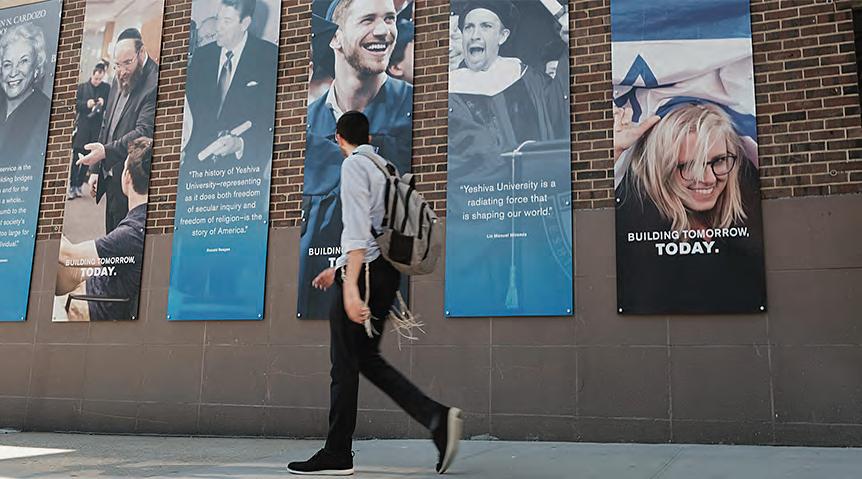
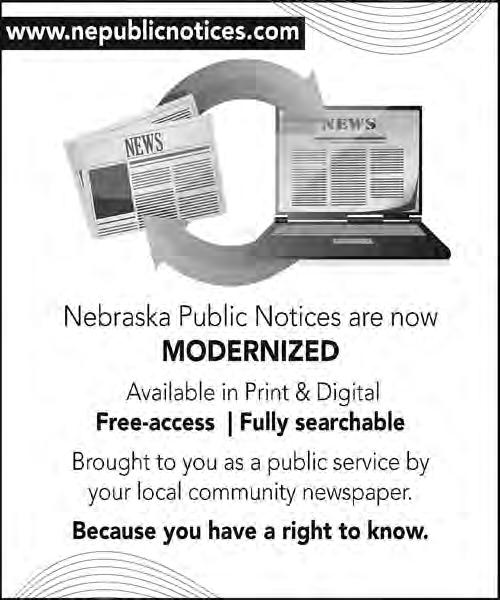
ANNOUNCEMENT
Now, the university, which is split between men’s and women’s campuses in two separate Manhattan locations, announced that it was ceasing its court battle and recognizing an LGBTQ-oriented club.
“The parties have reached an agreement and the litigation is ending,” the statement said. “Current students will be implementing a club, to be known as Hareni, that will seek to support LGBTQ students and their allies and will operate in accordance with the approved guidelines of Yeshiva University’s senior rabbis.”
The statement added, “The club will be run like other clubs on campus, all in the spirit of a collaborative and mutually supportive campus culture.”
The statement did not detail why Y.U. made the decision to recognize the LGBTQ club now. But the announcement comes weeks after a student was allegedly assaulted on campus and called homophobic slurs. It also comes as Y.U. has positioned itself as a refuge for Jewish students seeking to transfer from non-Jewish schools.
Immediately after Y.U.’s announcement, the Pride Alliance WhatsApp group changed its name to “Hareni,” according to the Commentator, the student newspaper.
“It is with great pleasure and excitement that we announce to everyone that we are now an official club at YU!” students Schneur Friedman and Hayley Goldberg wrote in the WhatsApp group, according to the Commentator. “We are honored to begin this official club as your co-presidents and will continue to foster a strong community within YU!”
Conditions at Y.U. have changed since the school first mounted a legal battle to avoid recognizing an LGBTQ club. For one, the school has — since Hamas’ Oct. 7, 2023, attack on Israel — appealed to Jewish students at nonsectarian colleges to transfer as a way of avoiding the spread of campus antisemitism, which could draw a more religiously diverse student body.
“I have heard people talk about Y.U. and the Pride Alliance as — ‘People know what they’re getting into when they come here, and if they wanted a queer club, they should have gone somewhere else,’” said Rachael Fried, executive director of Jewish Queer Youth, which has provided support to the Pride Al-
TO SUBMIT ANNOUNCEMENTS
Announcements may be e-mailed to the Press at jpress @jewishomaha.org; or mailed to 333 So. 132 St., Omaha, NE 68154. Readers can also submit announcements -- births, b’nai mitzvahs, engagements, marriages, commitment ceremonies or obituaries -- online at www.omahajewishpress. com/site/forms/. Deadlines are normally nine days prior to publication, on Wednesdays, 9 a.m. Please check the Jewish Press, for notices of early deadlines.
ing photos of the organizer, then shoving him while calling him homophobic slurs and telling him that he did not belong at Y.U. The column said victim reported the incident to campus security.
The university had previously argued in court that recognizing an LGBTQ club violated its religious liberty, though the plaintiffs argued that because it was chartered as a secular institution, that argument did not pass muster. The case at one point made it to the Supreme Court, which ruled 5-4 to send it back down to lower courts.
Shortly afterward, the university briefly suspended all student clubs rather than recognize the Pride Alliance. It later announced its own club to support LGBTQ students “under traditional Orthodox auspices.”
The Pride Alliance and its allies rejected that club, but a Y.U. spokesperson suggested in a statement that the school views Hareni as the current version of that club.
“Our students’ well-being is our primary concern,” the statement said. “We have always been focused on providing our undergraduate students the right spaces that fit within the unique religious environment of YU, which is different than any other college campus. We are pleased that our current undergraduate students will be leading the new club announced today that was envisioned and approved by our Senior Rabbis over two years ago.”
One of the plaintiffs in the case, Doniel Weinreich, said the school’s announcement was a milestone for LGBTQ Orthodox inclusion.
“This agreement affirms that there has never been a genuine conflict between Torah values and open LGBTQ+ identity,” Weinreich said in a statement. “It demonstrates that fully committed Orthodox Jewish environments can also be affirming of LGBTQ+ constituents. This is a great moment for the entire Modern Orthodox community.”
The new name for the club, Hareni, is the beginning of a Jewish statement of commitment to love one’s neighbor.
“This has been an ongoing conflict so there’s work that has to be done to make sure that Y.U. actually feels like a space where queer students can feel like their whole selves,” Fried said. “The administration working with the actual queer students is the right path to actually get to that place.”

ADVERTISE STATEWIDE for $225/25 word classified ad. Over 140 newspapers with circulation of more than 237,000. Contact the Jewish Press or call 1-800-369-2850.
HELLO NEBRASKA! Introducing www.nepublicnotices.com, a new public notice website presented as a public service by all Nebraska newspapers. Free access, fully searchable – because democracy depends upon open government and your right to know.
BANKRUPTCY RELIEF! Help stop Creditor Harassment, Collection Calls, Repossession and Legal Actions! Speak to a Professional Attorney and Get the Help You NEED! Call NOW 844-215-3629.
AFFORDABLE PRESS Release service. Send your message to 155 newspapers across Nebraska for one low price! Call 1-800369-2850 or www.nebpress.com for more details.
FOR SALE – CELL PHONE
SWITCH AND save up to $250/year on your talk, text and data. No contract and no hidden fees. Unlimited talk and text with flexible data plans. Premium nationwide coverage. 100% U.S. based customer service. For more information, call 1-877-768-5892.
FOR SALE - SATELLITE
GET DISH Satellite TV + Internet! Free Install, Free HD-DVR Upgrade, 80,000 On-Demand Movies, Plus Limited Time Up To $600 In Gift Cards. Call Today! 1-877-688-4784
FOR SALE - SENIORS
PORTABLE OXYGEN Concentrator? May be covered by Medicare! Reclaim independence and mobility with the compact design and long-lasting battery of Inogen One. Free information kit! Call 855-385-3580.
HOME SERVICES
DOES YOUR basement or crawl space need some attention? Call Thrasher Foundation Repair! A permanent solution for waterproofing, failing foundations, sinking concrete and nasty crawl spaces. FREE Inspection & Same Day Estimate. $250 off ANY project with code GET250. Call 1-844-958-3431.
THE BATHROOM of your dreams in as little as 1 day. Limited Time Offer - $1000 off or No Payments and No Interest for 18 months for customers who qualify. BCI Bath & Shower. Many options available. Quality materials & professional installation. Senior & Military Discounts Available. Call Today! 1-855-451-2244
WANTED TO BUY
WE BUY 8,000 cars a week. Sell your old, busted or junk car with no hoops, haggles or headaches. Sell your car to Peddle. Easy three step process. Instant offer. Free pickup. Fast payment. Call 1-855-910-0760.
DEBORAH DANAN JTA | JERUSALEM
Welcoming children for a Purim celebration recently, the security guards at the official home of Israel’s president drew laughs when they asked a routine security question: Was there any metal in the children’s costumes?
These weren’t typical visitors. The children wore a costume designed around their mobility device – wheelchairs and walkers transformed into rockets, game consoles, and circus tents. Yes, there was metal inside.
Hosted by First Lady Michal Herzog, the event marked the 10th anniversary of an initiative that creates custom Purim costumes for children with disabilities. Organized by Beit Issie Shapiro, a nonprofit focused on disability inclusion, the project paired dozens of children with professional designers from the Holon Institute of Technology and, for the first time this year, website builder Wix.
Inside the main atrium, the usual decorum dissolved into an atmosphere of energy and spontaneity, with children wandering freely across the space and interrupting the proceedings with enthusiastic outbursts.
President Isaac Herzog made an unscheduled appearance, stopping to speak to the children and pose for photos. His wife, Michal, spent several minutes with each child. At one stage 9year-old Oz Rappaport, dressed as Jett from the animated TV series Super Wings, yelled out, “Where’s the president?” Not missing a beat, Herzog raised his hands and identified himself. Rappaport later shared details of his bright red airplane costume with the first lady. Midway through, he paused, fixated on the gold watch on her wrist. Without hesitation, she slipped it off and handed it to him. The two examined it together, Michal Herzog listening as he gave a running commentary on the watch’s features. As their exchange came to a close, Oz extended his index finger toward hers. Herzog met the ges-
ture, and with a grin, he declared, “We’re getting electricity flowing between us,” mirroring the iconic moment from E.T.

Avital Grunberg’s walker had been transformed into a game of Block Blast, an online game that — as she patiently explained to Michal Herzog and some of the older generations in attendance — is not unlike Tetris. Unlike many participants who are less verbal and whose costumes were requested by parents or therapists, Grunberg had provided her designers with clear specifications for her design.
She asked that her costume be interactive so that her friends at school could play with it and requested a yellow ribbon to honor the hostages still held in Gaza — one of many ways that the annual event was tinged with reminders of the country’s year and a half of war.
For Michal Herzog, reflecting in her office after the children had gone home, the event offered a stark lesson about how Israel would need to change to accommodate the large number of wounded soldiers returning with disabilities, including amputees.
“The entire society has to be more accessible,” she said. “We are sadly seeing many more people now with wheelchairs and with disabilities in our society. But this will have to bring a change to society, and make us more tolerant, more understanding. This isn’t about huge budgets. We need to just be more aware of how to act, say, when someone gets on the bus with a service dog.”
Oz Rappaport’s mother, Shoshana, also reflected on the challenges of war, particularly the struggle of rushing to a bomb shelter — without a safe room at home — with a baby and a child who is not independently mobile. Though it had been some time since rocket sirens last sounded in their area, she said her son was still processing the experience. “Just today he heard an ambulance outside and said, hey, we need to go to the shelter,” she said. The party offered a respite from that stress.
Grunberg, who attends a mainstream middle school, has also found respite through her lifelong involvement with Beit Issie for most of her life, first as a toddler at its early intervention center, and now as part of its teen leadership group.
“During the year, I feel different, and not in a good way,” she said. “People look at me, and I don’t want to feel different. But now I feel different in a good way. People are looking at me not because of my disability and my walker, but because of my costume and how special it is.”
As the event wrapped up, Michal Herzog reflected on the gathering. “I’m looking around at our staff here and I don’t remember a time we were smiling so much at an event here, ever,” she told the crowd.
She added, “These are painful and sad days. We have visited over 1000 bereaved families and such an event that brings a smile to us and the team is unusual and so much more special and significant at times like these. Our greatest asset is our unity, and one cannot have unity without inclusion.”
Read more at www.omahajewishpress.com
